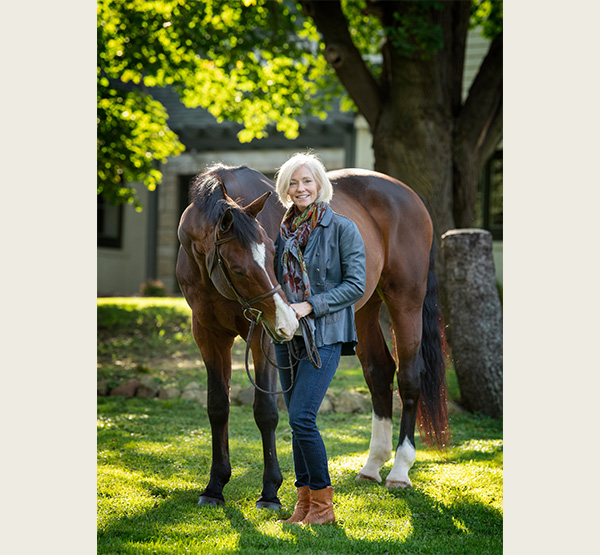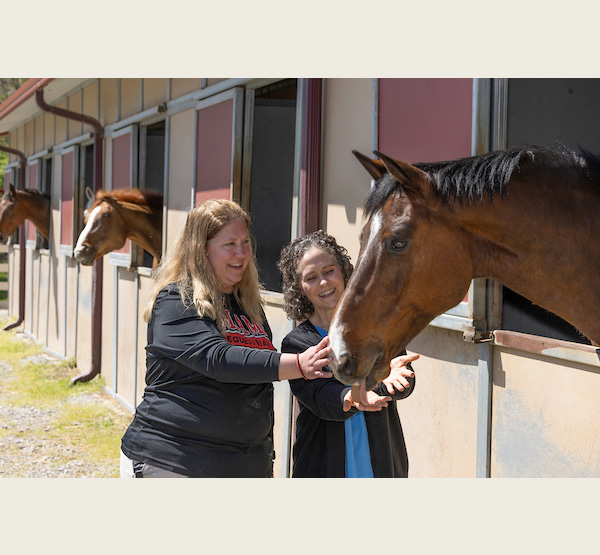Miami offers horse therapy as a way to support student mental health
Therapy sessions involve talking to a counselor while grooming a horse

Miami offers horse therapy as a way to support student mental health

'It creates a unique bond'
This all came about after Mary Beth Canfield ’90, a former equestrian team member who now serves on Miami’s Foundation Board, was part of a group exploring ideas.
Canfield and her husband were on campus for meetings last November and were talking to Steve Large, assistant vice president for health and wellness, about the success of the dog therapy program. She was intrigued. She said Ryan Elias, chief development officer of the Miami University Foundation, “brought up the concept of equine therapy as a way to reach more students, and it’s also an area he knows I am passionate about.”
Canfield added, “I then took the idea to Heather Pinnick at the equestrian center and learned that she and her team had already done a little bit of this work at the facility. She was interested in doing more of it."
Canfield, who owns and rides horses, loves the idea of Miami offering equine-assisted therapy for students.
“I know many people in the field of equine therapy and have learned that it can be beneficial in reaching people in a deep and unique way,” Canfield said.

'I can't believe you offer this'
So, what is it about horses that make them perfect for this type of therapy?
“To know them is to love them," Canfield said. "I find the animals extremely therapeutic. Some of the reasons why are that they are beautiful and strong, but so peaceful and calm." She added, “It creates a unique bond. There is often fear that needs to be addressed and trust that needs to be established.”
Pinnick sees the therapy as “a great avenue for using the horses in a different way.”
At the beginning of each session, she selects a horse from the four they use: Lola, a gray pony; Carly, a quarter horse; Fendy, a warmblood; and Gracie, a quarter horse.
Pinnick, who has worked at the equestrian center for 19 years, said, “Horses are really intuitive of how you’re feeling. I think they’re offering a little buffer for the therapy sessions to the students who may feel comfortable because they are doing an activity and have the horse as that focus.”
Young said she and the student start at the stall to put on a halter, then they lead the horse to the indoor cross-tie grooming area where they move between using a curry comb to remove dirt from the horse’s coat, a soft brush, tail brush sprayed with detangler, and a hook pick.
“As we’re grooming and picking out their hooves, we’re talking,” she said, adding that this kind of therapy has been found to reduce anxiety and depression and also is good for those who have dealt with trauma.
They offer the therapy during a noon-2 p.m. window when things are quiet at the normally busy equestrian center.
“It’s kind of a free period that the horses are available to be used for something like this,” Pinnick said.
Young — who usually arrives with a bag of apples for the horses — said students have told her how much they enjoy the program and how the experience helps them feel less stressed and more relaxed.
“They say things like ‘I can’t believe you offer this’ and ‘I have to do this: Let me sign up.’ Afterwards, they’ll say things like ‘This was the best thing I’ve done all semester long,’” she said.
“They look forward to it. It’s the highlight of their week — and mine, too.”
Established in 1809, Miami University is located in Oxford, Ohio, with regional campuses in Hamilton and Middletown, a learning center in West Chester, and a European study center in Luxembourg.
Interested in learning more about Student Counseling Service? Visit the website for more information.